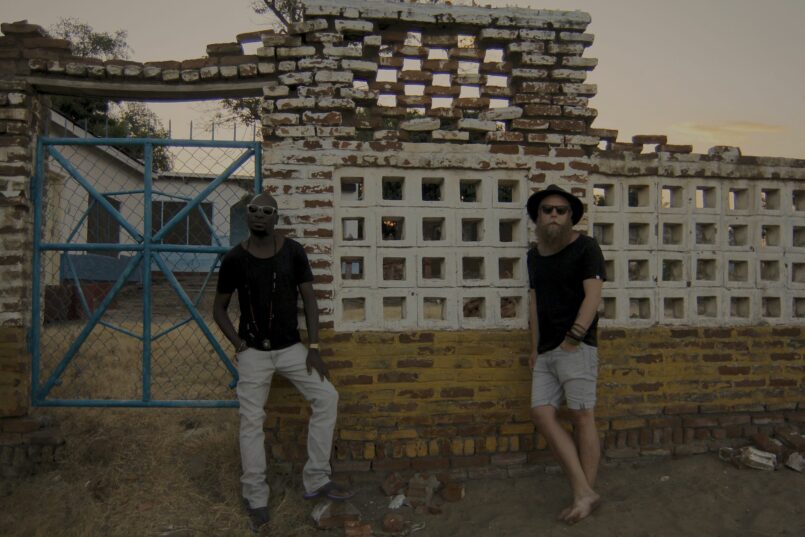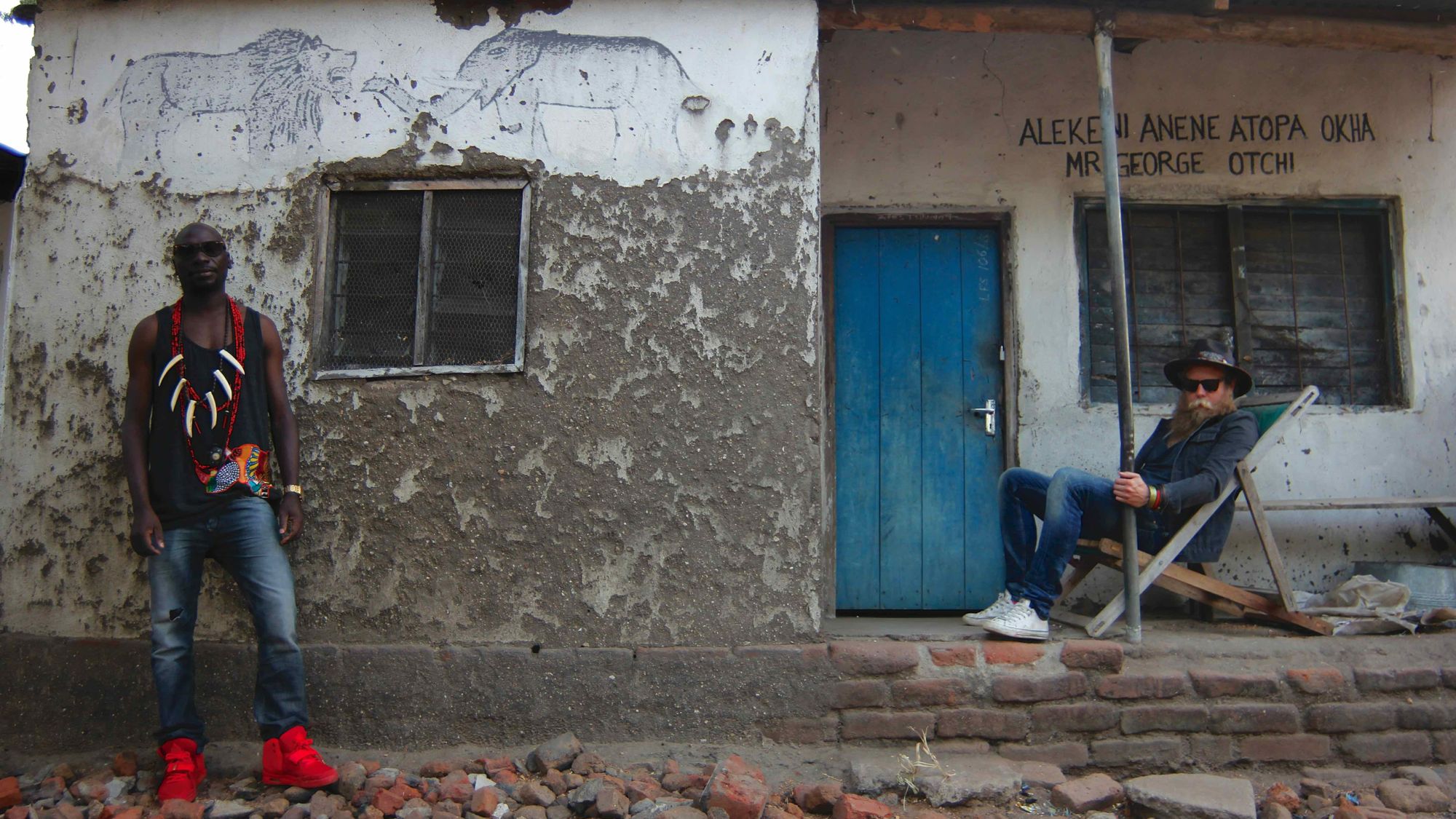Johan Hugo has an exceptional ear. Since The Very Best’s first mixtape in 2008, he and former production partner Etienne Tron have heard the connections between traditional African melodies and rhythms, four-on-the-floor Swedish techno, and American pop and indie rock. Tron left the group following their debut, Warm Heart of Africa, but The Very Best’s sound has remained singular, a unified glossolalia of dance music. But, as Hugo tells me, “It’s always been about Esau’s voice.”
That’s Malawian singer Esau Mwamwaya, the group’s cofounder, whose technical range and limitless charm form the emotional core of the music he and Hugo make together. For The Very Best, the beats—and now, with Makes A King, the churning guitar and stuttering bass of a live band—have never been the driving force; instead, they make up a well-stocked gymnasium where Mwamwaya can work out his instrument on a variety of machines. And it’s a glorious thing to witness his flexing.
On Makes A King, Mwamwaya is at his most versatile. He trumpets a clarion call in opener “Nkhondo [War],” then bends into lamentation in “Hear Me,” where Hugo surrounds him with snippets of pitch-shifted voice and a beat that lurches forward like an overnight march. Later, Mwamwaya cedes the spotlight to Malawian group Jerere, content to sing harmony with his countrymen. It’s a new look for a band that made its reputation on sunny dance floors, but Mwamwaya is just as compelling a singer when he’s cooing over a dark-toned nightclub beat as he is when leading a Malawian choir.
When FLOOD caught up with Hugo, he was sipping from a can of Kronenbourg 1664 at his home in London. He told us about recording outdoors, the band’s fame in Malawi, and why the only people who ask him about colonialism are, as he put it, “white journalists in the West.”

You guys tried some new recording techniques for Makes A King. Can you tell me about the process?
Johan Hugo: We went into a really small village five hours from the capital of Malawi, on Lake Malawi. We shut ourselves away for a few months, so there were no distractions. Mobile phones didn’t work, and there was no Internet at all. You’re there and all you’ve got is the music, the beach, and the people and nature around you.
Did you feel like the surroundings influenced the recording?
Very much so, especially because most of the record was recorded outdoors—anything that wasn’t plugged in, drumming, choirs; any instrumentation that was mic’d, Esau’s vocal. We really wanted to bring in elements of the surroundings, whether it’s kids playing on the beach or women washing their clothes in the lake in the daytime. Crickets at night, the thunder in the background; you don’t really hear it unless you know it’s been recorded outside, but once you know, you can pick it up.
We also used local people. Word spread in the village that we were there, so people would come by. They’d bring instruments and we’d sit around and play a bit, and every now and then we’d record something. It was a very organic process.
“[Esau] would be offended if someone said it’s wrong of Vampire Weekend to use Kwassa Kwassa on their album. It’s the political correctness of the Western world to see this as a problem.”
Are you guys well known in Malawi?
Esau isn’t one of the biggest artists in the country, but everybody knows who he is and thinks he’s a massively famous guy outside of Malawi. People know my face, they recognize us. But I think the music is a little bit weird for the local Malawians. We’re looked at like weirdos. The music that we make is nothing like Malawian music… Well, it is and it isn’t. “Guju Guju [Shake Shake]” on the new album is a remake of a very old Malawian song. It’s rewritten, but the chorus is from an old song that everybody knows. They hear the new version of that and they’re like, “Woah, hold on, what’s going on here? And who’s the white guy?”
Do you guys frequently rework traditional Malawian songs?
We don’t really, [but] we both encourage it. We both like it. For Esau, it’s like he pays homage to his traditional music. You start working on these songs, and if you do it where we were, you suddenly have fifty kids wandering up and sitting down on the beach, and suddenly everyone’s singing the song. It’s such a cool experience.
I’m guessing that that’s what happened with the a cappella track “Bilimankhwe [Chameleon].” What’s the story there?
We wanted to get [a traditional Malawian band] to come in and play small stuff on most of the songs. We kept honing in on this band Jerere. They’d play their own songs and I’d have my mics running. In the middle of it all, they started singing “Bilimankhwe.” Esau knew the song, but he’s not the lead voice; he’s singing one of the harmonies. That’s just them singing that song, one take. When we came back to London I was like, “This is fucking amazing, I have to use it.”
Do you ever feel tense about being a white European coming into such a distinct African setting?
We’ve never paid any attention to it, and we’ve never gotten any beef over it the same way Vampire Weekend or Paul Simon or plenty of other people did. I like when these questions get asked when Esau is around, though. But I think that’s why I never got shit for it, because it’s me and Esau. He would be offended if someone said it’s wrong of Vampire Weekend to use Kwassa Kwassa on their album. He’s like, “Why shouldn’t they do that?” It’s the political correctness of the Western world to see this as a problem. And of course it can be a problem, but it depends on how it’s done. I’ve never felt uncomfortable with it. I’m making music with one of my best friends who I met in London, and he just happens to be from Malawi. FL







